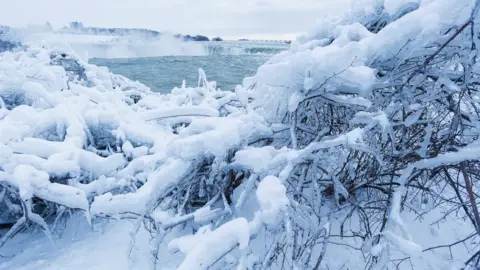'Bomb cyclone': Explosive winter storm hits US
A severe winter storm is hitting eastern North America, extending a cold snap that has already claimed 11 lives.
Forecasters say a severe pressure drop has led to an explosive winter storm along the eastern US, and has already brought snow to Florida.
The US is currently on its 11th day of record-breaking frigid temperatures which began around Christmas.
But the predicted new storm has led meteorologists to deploy a new term - bomb cyclone.
 Reuters
ReutersThe National Weather Service (NWS) has warned that "Arctic air mass will remain entrenched over the eastern two thirds of the country through the end of the week".
"Very cold temperatures and dangerously cold wind chills expected," the NWS added.
What is a 'bomb cyclone'?
A "bomb cyclone" or "weather bomb" is an unofficial term for what is known as explosive cyclogenesis, according to BBC Weather.
This occurs when the central pressure of a low pressure system falls by 24 millibars in 24 hours and can result in violent winds developing around the system.
The winds can be strong enough to bring down trees and cause structural damage.

You may also like

The storm, the Washington Post adds, will "in many ways resemble a winter hurricane" which could be the eastern US's most intense in decades.
Where is it expected to hit?
On Thursday and Friday, the major storm is expected to develop along the eastern seaboard of the US, bringing strong winds, rain, sleet and snow, according to BBC Weather.
The storm is forecast to undergo rapid cyclogenesis over the Atlantic Ocean, and current projections show areas north of New York as having the highest risk of significant impacts from strong winds and heavy snow.
Allow X content?
Major north-eastern cities such as Boston are at risk of blizzards, and it is expected to cause disruption at air travel hubs with power outages also possible.
Governors have issued states of emergency in Florida, Georgia, North Carolina and Virginia, and schools have been cancelled or delayed in several states.
New York City may see up to one foot (30cm) of snow fall, and similar or higher levels are expected throughout New England.
The US federal government delayed opening for two hours on Thursday.
Parts of Florida, including the northern city of Tallahassee, have already seen their first snow settling in decades.
Excited residents snapped photos of themselves playing in the snow, and school was cancelled in much of the state.
Allow X content?
Allow X content?
Is it cold everywhere?
No, it was actually colder in Jacksonville, Florida, than it was in Anchorage, Alaska, on Tuesday.
On Tuesday, the Merrill Field Airport in Anchorage recorded a temperature of 48F (9C) - higher than almost anywhere in the contiguous 48 states, that do not include Alaska and Hawaii.
Antarctica's Amundsen-Scott South Pole Station recorded a temperature on Tuesday of -12 (-24.5C)F, just one degree warmer than Indianapolis, Indiana.
On the other side of the Atlantic Ocean, British officials are warning that Storm Eleanor, which has already caused flooding and power outages, will pose a danger due to flying debris in high winds.
US meteorologist Dr Marshall Shepherd told the BBC that while it is colder than normal in parts of the US and Canada, most of the rest of the world is actually warmer than normal this week.
What about Canada?
Environment officials warned that a major winter storm is expected to smash into the provinces of New Brunswick, Nova Scotia and Prince Edward Island on Thursday.
Officials predict that snow and high winds may cause worse power outages than those that affected 158,000 customers in Nova Scotia on Christmas Day.
"We're encouraging customers to be prepared for potentially lengthy power outages as a result of this storm," Nova Scotia Power spokeswoman Tiffany Chase told the Canadian Press agency.
Earlier this week, king penguins at the Calgary Zoo in Canada's western Alberta province were kept in their indoor shelters to avoid the bitter cold.